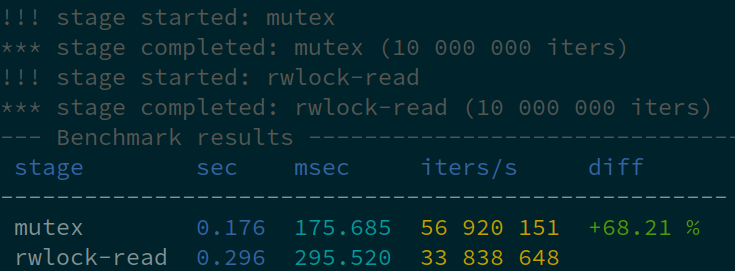bma-benchmark
Benchmark for Rust and humans
What is this for
I like testing different libraries, crates and algorithms. I do benchmarks on prototypes almost every day and decided to make a simple dedicated crate for that. Here we go: https://crates.io/crates/bma-benchmark
The benchmark engine is very simple to launch and outputs all required data in a pretty colored readable format.
How to use
Let us create a simple benchmark, using crate macros only:
#[macro_use]
extern crate bma_benchmark;
use std::sync::Mutex;
let n = 100_000_000;
let mutex = Mutex::new(0);
benchmark_start!();
for _ in 0..n {
let _a = mutex.lock().unwrap();
}
benchmark_print!(n);
The same can also be done with a single "benchmark" macro:
#[macro_use]
extern crate bma_benchmark;
use std::sync::Mutex;
let mutex = Mutex::new(0);
benchmark!(100_000_000, {
let _a = mutex.lock().unwrap();
});
Pretty cool, isn't it? Let us create a more complex staged benchmark and compare e.g. Mutex vs RwLock. Staged benchmarks display a comparison table. If the reference stage is specified, the table also contains speed difference for all others.
#[macro_use]
extern crate bma_benchmark;
use std::sync::{Mutex, RwLock};
let n = 10_000_000;
let mutex = Mutex::new(0);
let rwlock = RwLock::new(0);
staged_benchmark_start!("mutex");
for _ in 0..n {
let _a = mutex.lock().unwrap();
}
staged_benchmark_finish_current!(n);
staged_benchmark_start!("rwlock-read");
for _ in 0..n {
let _a = rwlock.read().unwrap();
}
staged_benchmark_finish_current!(n);
staged_benchmark_print_for!("rwlock-read");
The same can also be done with a couple of staged_benchmark macros:
#[macro_use]
extern crate bma_benchmark;
use std::sync::{Mutex, RwLock};
let n = 10_000_000;
let mutex = Mutex::new(0);
let rwlock = RwLock::new(0);
staged_benchmark!("mutex", n, {
let _a = mutex.lock().unwrap();
});
staged_benchmark!("rwlock-read", n, {
let _a = rwlock.read().unwrap();
});
staged_benchmark_print_for!("rwlock-read");
Or split into functions with benchmark_stage attributes:
use std::sync::{Mutex, RwLock};
#[macro_use]
extern crate bma_benchmark;
#[benchmark_stage(i=10_000_000)]
fn benchmark_mutex(mutex: Mutex<u64>) {
let _a = mutex.lock().unwrap();
}
#[benchmark_stage(i=10_000_000,name="rwlock-read")]
fn benchmark_rwlock(rwlock: RwLock<u64>) {
let _a = rwlock.read().unwrap();
}
let mutex = Mutex::new(0);
let rwlock = RwLock::new(0);
benchmark_mutex(mutex);
benchmark_rwlock(rwlock);
staged_benchmark_print_for!("rwlock-read");
Errors
The macros benchmark_print, staged_benchmark_finish and staged_benchmark_finish_current accept error count as an additional parameter.
For code blocks, macros benchmark_check and staged_benchmark_check can be used. In this case, a statement MUST return true for the normal execution and false for errors:
#[macro_use]
extern crate bma_benchmark;
use std::sync::Mutex;
let mutex = Mutex::new(0);
benchmark_check!(10_000_000, {
mutex.lock().is_ok()
});
The benchmark_stage attribute has check option, which behaves similarly. If used, the function body MUST (not return but) END with a bool as well.
If any errors are reported, additional columns appear, success count, error count and error rate:
Need anything more complex? Check the crate docs and use structures manually.
Enjoy!








